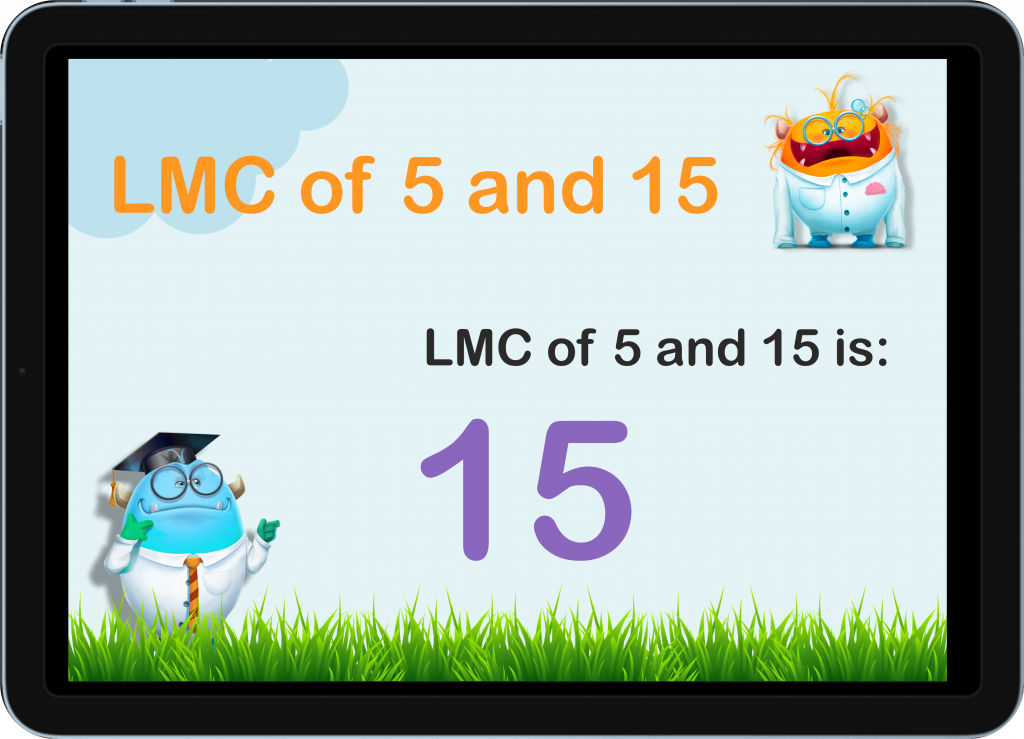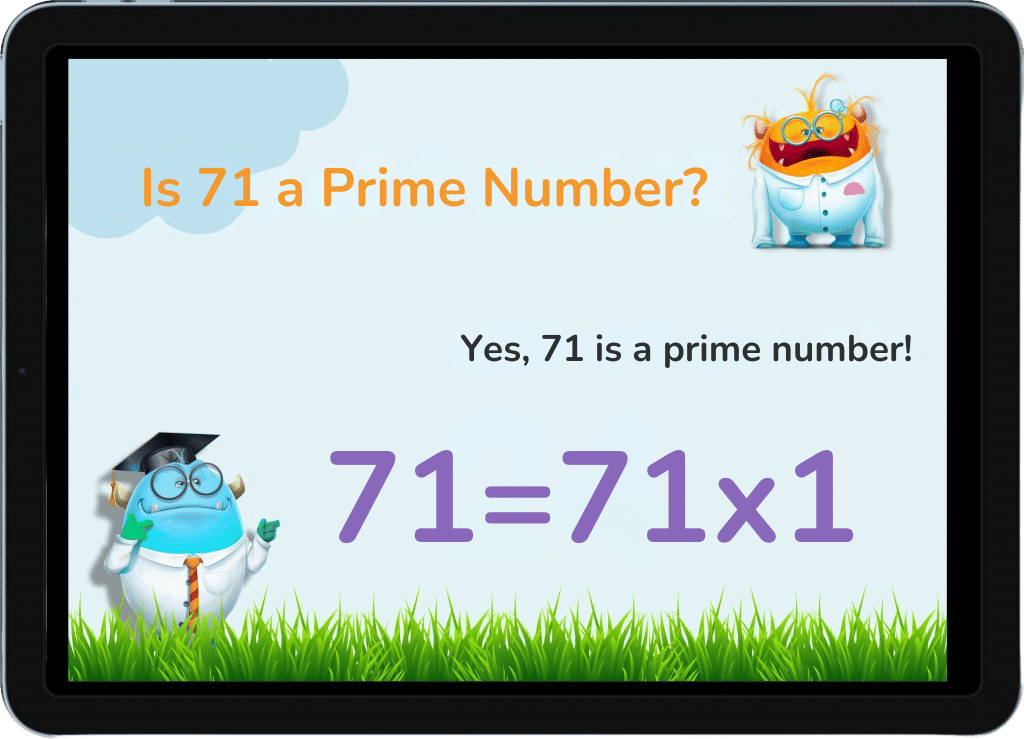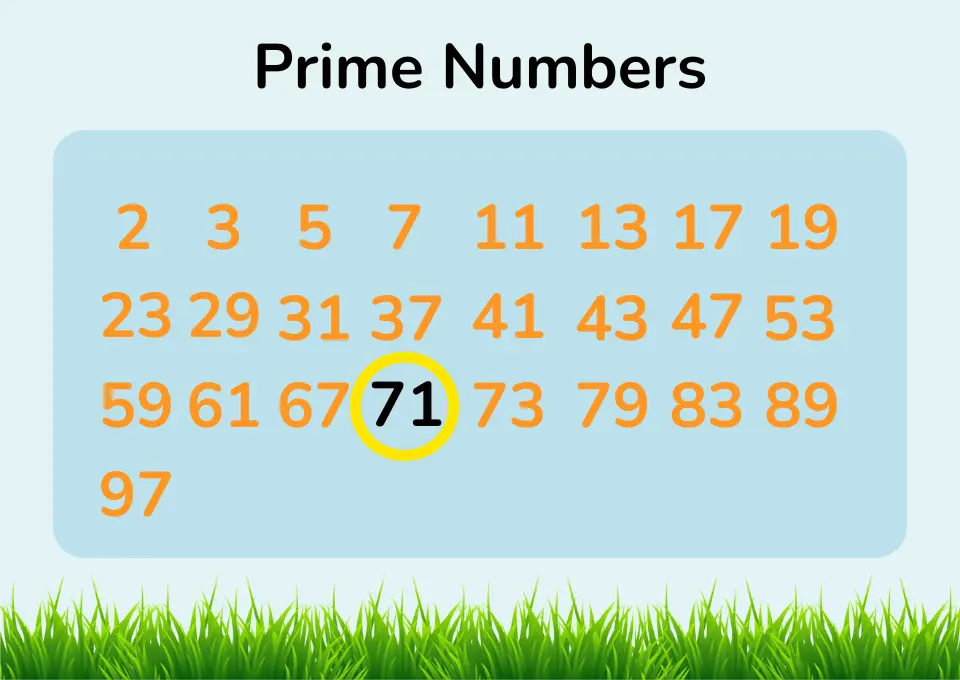Is 2 A Prime Number?
Prime vs. Composite Numbers
Greetings, young math enthusiasts! Today, let’s set sail on a mathematical voyage to determine if 2 is a prime number, and learn more about the difference between prime and composite numbers.

Is 71 a Prime Number?
Or Is 71 a Composite Number?
Imagine a grand ballroom filled with numbers. Most numbers, like 4, 6, 8, and so forth, have many dance partners—they can be divided by several numbers without leaving a remainder. However, prime numbers, like 71, are more discerning. But how do we confirm such a claim? Let’s see!


No credit card required

No credit card required
What Makes a Number a Prime Number?
Is 71 a Prime Number?
How is 71 a Prime Number?
How to Determine if 71 is a Prime Number
Prime Factorization of 71
Fun Facts About 71 Prime Number
Is 71 a Twin Prime Number?
Is 71 a Cousin Prime Number?
Is 71 a Sexy Prime Number?
Is 71 a Composite Number?
What Makes a Number a Prime Number?
In the whimsical world of mathematics, numbers often behave like characters in a grand, endless story. Some are ordinary, some are peculiar, and some are extraordinary in their simplicity and beauty. Among these characters, prime numbers hold a special place. A prime number is like the most exclusive club member in the number world—admittance is allowed only if the number can boast of exactly two distinct positive divisors: one and itself.
Imagine, if you will, a grand ballroom filled with numbers. Most numbers, like 4, 6, 8, and so forth, have many dance partners—they can be divided by several numbers without leaving a remainder. However, prime numbers are more discerning. They will dance only with themselves and the number 1. They shun any other divisor. This unique trait makes them fascinating to mathematicians and curious minds alike.
Is 71 a Prime Number?

Now, let’s introduce our protagonist: the number 71. Standing tall and proud, 71 confidently declares its prime nature. But how do we confirm such a claim? By the simplest of methods—division.
A prime number, as we’ve established, must be divisible only by 1 and itself. To determine whether 71 fits this description, we embark on a journey of division, checking to see if any number other than 1 and 71 can divide it without leaving a remainder. Spoiler alert: 71 is indeed a prime number, and its tale is one of purity and exclusivity in the realm of numbers.
How to Determine if Number is a Prime Number?
Determining the primality of 71 (or any number) involves a systematic approach:
- Check for Divisibility by 2: If the number is even, it’s not prime (except for 2).
- Check for Divisibility by 3: Sum the digits of the number. If the sum is divisible by 3, so is the number.
- Check for Divisibility by 5: If the number ends in 0 or 5, it’s divisible by 5.
- Continue with Other Primes Up to the Square Root: Check divisibility by 7, 11, 13, etc., up to the square root of the number.
Using these steps, one can confidently determine that a certain number is prime, as it fails to be divisible by any numbers other than 1 and itself.
How is 71 a Prime Number?
The story of how 71 is a prime number is quite simple yet elegant. To verify its prime status, we attempt to divide 71 by all prime numbers less than its square root (approximately 8.4). Why do we stop at the square root, you ask? Because if 71 had a factor larger than its square root, the corresponding factor would necessarily be smaller than the square root, and we would have already encountered it.
Let’s list the prime candidates we need to check: 2, 3, 5, and 7.
- Dividing by 2: 71 is odd, and thus not divisible by 2.
- Dividing by 3: The sum of the digits of 71 (7 + 1 = 8) is not divisible by 3, so 71 isn’t either.
- Dividing by 5: 71 doesn’t end in 0 or 5, so it isn’t divisible by 5.
- Dividing by 7: Dividing 71 by 7 gives a quotient of approximately 10.14, which isn’t an integer.
Since 71 isn’t divisible by any of these prime numbers, it confirms its prime status.
Prime Factorization of 71
The prime factorization of a number involves expressing it as a product of prime numbers. For some numbers, this can be a lengthy process. For 71, however, the process is delightfully simple. Since 71 is a prime number, its only prime factor is itself. Thus, the prime factorization of 71 is:
71=711
No other factors are involved, making this a straightforward and elegant factorization.
Prime Factorization of 71
Every prime number has its own quirks and interesting properties. Here are a few fun facts about the number 71:
- Prime Position: 71 is the 20th prime number.
- Twin Prime: 71 pairs with 67 to form a twin prime. Twin primes are pairs of primes that differ by 2.
- Sexy Prime: 71 forms a sexy prime pair with 65 and 77. Sexy primes are pairs of primes that differ by 6.
- Cousin Prime: 71 and 67 are also cousin primes, differing by 4.
- Hexagonal Star Number: 71 can be expressed as a hexagonal star number, which is a figurate number representing a hexagram.
Is 71 a Twin Prime Number?
Ah, twin primes! These are pairs of primes that are as close as siblings, differing by exactly 2. The number 71 has a twin: 73. Together, they form the twin prime pair (71, 73). Twin primes are a subject of much fascination and study in the field of number theory.
Is 71 a Cousin Prime Number?
Cousin primes are pairs of primes that differ by 4. In our number’s case, 71 and 67 also fit this criterion, making 71 part of a cousin prime pair with 67. This dual status as both a twin prime and a cousin prime is quite rare and adds to the charm of 71.
Is 71 a Sexy Prime Number?
Sexy primes have a rather playful name, derived from the Latin word for six: “sex.” These primes differ by 6. The number 71 has two numbers sitting 6 seats from it, pairs: (65, 71) and (71, 77).
Are they sexy primes though?
No, 65 and 77 are not prime numbers. Therefore, prime number 71 has zero sexy twin primes.
Is 71 a Composite Number?
No, 67 is not a composite number. A composite number has more than two divisors, whereas 67 can only be divided evenly by 1 and itself. This makes 67 a prime number, not a composite one.
Conclusion
In the grand tapestry of numbers, 71 stands out with its prime status and unique properties. From being a twin prime to a sexy prime, 71’s characteristics make it a subject of interest and curiosity.
Understanding the nature of prime numbers like 71 not only enriches our mathematical knowledge but also deepens our appreciation for the elegant structure of the number world.
So next time you encounter the number 71, remember the rich and fascinating story it tells.
Learn More About Prime Numbers
© 2024 Smartick. All Rights Reserved.
